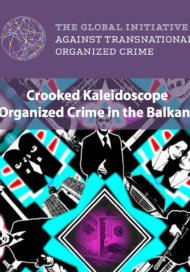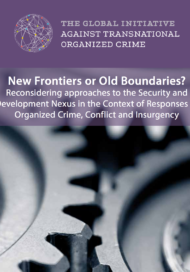Posted on 16 Apr 2014
Odd Berner Malme, a veteran policeman from Norway, is now at the cutting edge of transforming a militarized police force in Serbia into one that better serves the needs of the public. This is no easy task in a region where organized crime has been a tool in the hands of Balkan governments for decades. Malme spoke to the GI about his eventful career in Oslo, New York and now Belgrade, where he says it will take years of reform efforts – even spanning generations – to repair the damage.
With his diplomatic experience and impressive track record regarding police transformation, it is no surprise that Malme, a founding member of the Global Initiative, is currently working with the OSCE (Organization for Security and Cooperation in Europe) mission to democratize the Serbian police force. Based in Belgrade, he is on contract to head up the OSCE’s law enforcement division, the largest aspect of the 57-member state mission to Serbia, until July this year.
After finishing his training at the Norwegian National Policy Academy in 1970, Malme worked his way up the police service, heading up the crime intelligence and organized crime division in Oslo at one point. One of the highlights of that period was setting up a national and regional cooperation initiative, which included Norway, Sweden, Denmark and Czech Republic, and which led to the seizure of vast amounts of heroin coming through the Balkan route to Scandinavia. “We broke the smuggling code and several Albanians were arrested and sentenced to many years in jail,” recalls Malme.
He served as Deputy National Police Commissioner of Norway from 2000 – 2007 and during this time was involved in efforts to improve the Norwegian Police Service (www.politiet.no). Unlike in Serbia, human rights were already highly valued by the Norwegian police, he says. “Our challenge was to try to make policing much more effective.”
Malme was involved in many fascinating special assignments during his career with the Norwegian Police Service. He went on a fact-finding mission to Afghanistan and was part of the Norwegian task force to Thailand after the tsunami in 2004.
He has a long history with the Norwegian Security Service where he worked for many years in the field of espionage and counter terrorism. He has also served with the Ministry of Justice on police performance and international cooperation.
In 2007 Malme was appointed as police advisor to Norway’s permanent mission to the United Nations in New York. There he worked on peace and security and the rule of law, with a main focus on peacekeeping operations, counter terrorism and transnational organized crime. Malme describes this time as a steep learning curve, where he learnt how the complex world of global politics operates, and where he became a true “New Yorker”, he laughs.
Malme, who is married with two children and four grandchildren, loves to spend time in nature, where he hikes and hunts grouse with his beautiful Irish setter. He enjoys movies and music, particularly the latter. In his youth he played trombone for a big brass band but says he’s not likely to take up playing the instrument again. Instead he prefers taking either the Harley Davidson motorcycle or the 1972 Ford Ranger Pick Up, both which he brought back with him from the United States, for a spin.
1. As head of law enforcement at the OSCE Mission to Serbia you have led initiatives to help reform the Serbian police force. What are some of the challenges that you’ve experienced?
The police force was heavily abused during Slobodan Milosevic’s time and after the war, it looked more like a military force than a police service. Everything was very centralized. We are trying to transform this mindset of government control to one where the police service has a better understanding of how to serve the public, but this takes a lot of time. Not only is the police force governed by rules and regulations, it is also very often a conservative agency. Members like to do business as usual, instead of looking to the future. Also it’s very important to have local ownership but this means a slow, step-by-step approach. The Serbians are getting to the point where they can take responsibility for their own future but we need to have sustainable processes. Along with community policing, we are trying to increase capacity in fighting organized crime. But it takes a lot of time and money to achieve this evolution. We are grateful to all the donors who fund this mission and who believe in what we’re doing.
2. Can you give a brief account of how widespread organized crime is in Serbia and the Balkans generally, and where the biggest challenges lie?
The alliances between organized crime and security sector agencies in the Balkans during the communist period had a strong impact on all government operations. Also, the perpetrators of organized crime took full advantage of the civil war in the Balkans. The criminals were employed and trained by state agencies and the criminal groups became a kind of parallel government. The two most important tools for organized crime to flourish were present when organized crime took hold: corruption and violence. During the ten years of ethnic clashes, crime groups became entrenched, establishing the Balkan route for heroin from Afghanistan to Europe. Because of the war and sanctions, criminal groups were able to set up smuggling channels for food, medicines, energy supply, narcotics and weapons. Nowadays, it is mostly drugs that are being trafficked, but weapons and human beings are also being trafficked.
Organized criminals in the Balkans have for years been global in their approach, thus they make up a part of the transnational organized crime picture. They have always taken advantage of the Serbian diaspora. They are involved in high-level crime around the world and have direct contact with Mexican and Columbian drug cartels. Their global operations impact on the situation back in Serbia, where they have tight links to politicians and business people.
As for the corruption – the only way to stop it is to increase the risk of being caught, which means a strong investigation, prosecution and court system. Things are not cleaned up yet: organized crime still has a strong foothold in the Balkans, but the situation is certainly better than it was.
Although the war is over now there are still tensions with Kosovo. Nevertheless, things are improving, with Serbia keen for integration into the European Union. But some of these ethnic conflicts go back hundreds of years.
3. Is organized crime a growing problem in Scandinavian countries? It’s not something the world hears about too often.
We are in a happier situation than so many other countries because we are democracies with strong institutions. This makes us more suited to preventing and combating crime than countries that are emerging from conflict or that lack infrastructure. That’s not to say we don’t have organized crime. Because we have a strong economy there is lots of money around – it’s a buyer’s market for drug traffickers, even though the risk of detection is high. The motorcycle gangs dominate organized crime in Scandinavia: the Hell’s Angels, Bandidos and the Outlaws are the three main ones. They can be very violent. They’re an ongoing headache for the police. There are also some ethnically-based gangs from other countries, including Albania, Pakistan and Somalia, which pose big challenges for the police and society in general.
4. You’ve witnessed the goings-on of organized crime in two very different nations – Norway and Serbia. Does combating organized crime in these nations call for country-specific approaches or are there certain methods that can and should be employed regardless of the context?
There are some differences in approach, but there are also many similarities. In both contexts you need police and prosecution agencies dedicated to the fight. Also, you need a high-level skill set and a deep understanding of the “creature” that is organized crime and how it operates. Police across the world ultimately speak the same language. But you also need to be aware of the contextual differences: in Serbia, organized crime has a long history of being embedded in government and organized in clans and families, while in Norway, organized crime establishes itself through networks, with experts moving in and out of criminal operations.
5. What did you glean from your experience at the UN regarding transnational organized crime?
Transnational organized crime was debated at length in the General Assembly and the Security Council but very little in the way of recommendations came out of it. Everyone agreed that the issue constitutes a serious threat to democracy and freedom but it was – and still is – difficult to get solid recommendations on how member states should deal with it. It’s a sensitive issue and goes to the core of the sovereignty of states. This makes it hard for the UN to come with tough, direct recommendations.
6. What in your view are the biggest challenges being faced by those trying to combat transnational organized crime?
The globalization of organized crime. The perpetrators know no borders and take advantage of increasingly globalized legal trade and activity. Globalization in trade, finance, travel and communication has brought economic growth and improved quality of life for some, but it has also provided criminals with massive new opportunities. Nowadays, illicit goods can be sourced from one continent, trafficked across another and marketed in a third in a very short space of time. How can national law enforcement agencies combat this? Not with yesterday methods.
There are huge challenges when it comes to the cooperation between countries and regions. Different laws and regulations hamper cross-border operations, for example. Increasingly, operations are moving into the realm of cyberspace, necessitating specific resources, skilled personnel and advanced equipment for law enforcement to effectively follow the criminal activity. How to operate successfully in cyberspace will be the biggest challenge of the future. Do we need a transnational law enforcement agency? This is one of many questions that must be dealt with in the years to come.
7. Why do you see the Global Initiative against Transnational Organized Crime as an important development?
One of the reasons we started up the Global Initiative was the lack of response from the UN system – or anyone else – to what has become a global problem that requires global responses. With the GI network we can finally sit down and discuss why we are not succeeding. We need to improve our competence and our global cooperation. We need all stakeholders, not just from law enforcement, but from all backgrounds – the media, development people, economic researchers, policy analysts etc.
We need to be ready to meet organized crime where it starts, in countries with weak governments emerging from conflict. It is not for us to come as experts from the north and tell countries in the south what to do. We need a much more sophisticated, broader and holistic approach. We also need a better political understanding and the will to take brave political decisions. We need to talk less and act more.



